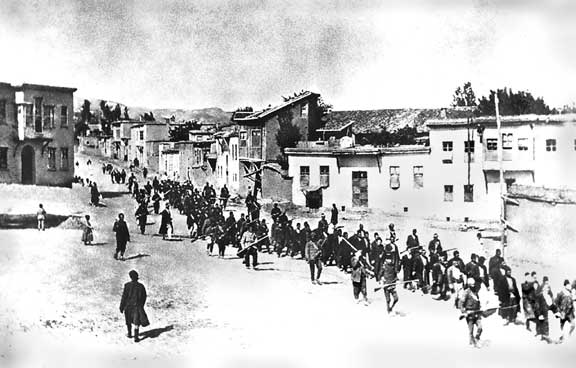
By Sofia Demirturk
Being born in an ultra nationalist Turkish family, the Armenian genocide was once a story about an imperialist conspiracy against our sovereignty, how Armenia had their eyes on our country, and how ungrateful they were for all the years we spent together in the lands of Anatolia.
My father used to tell me about the lies that Armenians told to the world, and how we Turks should never trust anyone, as every other nation is busy conspiring against us. The history classes we had back in school were no different, telling us about the impaled pregnant Turkish women and the villagers killed by Armenian militias. This would create an image of Armenians like that of monsters from mythology books — a depiction of ultimate evil. No wonder millions of Turkish citizens are in denial about the tragedy that happened 101 years ago at the hands of our ancestors, which cost 1.5 million lives.
I was in college when I had my moment of epiphany. It was my first year of economics and we had a compulsory social sciences class, which no one seemed to care about ( we attended it just to receive credits). I was astonished when the tutor, a young lady of 26-27, asked us how we felt about the Armenian genocide. Being a small town girl, I knew that Armenians had faced problems in history, but we were taught that it was not a genocide but deportation, it was the condition of the desert, it was anything but the state’s fault.
Welcome to Being Turkish 101 – the state is above everything, and everything that happened in the past is the fault of others, never the state itself. Living in a country whose pillars, whose very foundation is based on nationalism and a lighter form of xenophobia, it is never easy to question the credibility of what you have been taught, even if this challenges almost everything you have seen and heard.
Numbers being necessary for a solid hypothesis, harsh statistics are usually used to show reality, rather than making people feel the actual stories behind them. However, I am never fond of studying atrocities based on numbers, but prefer to study through the experiences of those who actually faced the consequences. I came to know of families, grandchildren of survivors, how families were torn apart and how, sadly, our history is about the sorrow and misery of so many.
Each family I met has their own share of it: grandparents witnessing the deaths of their family members; a young Ottoman-Armenian soldier fighting in the campaign of the Dardenelles, only to come back to his village to see nothing left; siblings meeting decades after the genocide only to discover one of them is now a Muslim and the other a proud Christian.
Of all these stories, one reality touched me the most — that I have dozens of cousins, uncles and aunts, able to have big family dinners on special occasions, whilst my Armenian friends were simply robbed of this opportunity, having their families scattered here and there and mourning for their close relatives.
Denial is not just being indifferent to the first genocide of the 20th century, but it is also making the survivors go through their trauma again and again in their quest of honouring the memory of their loved ones. Armenians all over the world, be it the Armenian diaspora in Marseilles or a young Armenian girl in Yerevan, Armenia, should now get the apology they deserve, and talk about the lives their ancestors had here before 1915.
After 101 years, we are still stubborn and indifferent, making campaigns and spending millions of dollars to argue, “But it was The Ottoman Empire”, “ASALA (Armenian Secret Army for the Liberation of Armenia) killed Turkish diplomats” — anything to justify the silence we had for all of these 101 years.
I know that saying “I am sorry” would never bring back the ones who are long gone, but this is the least we can do to remember the victims. It could be a very small piece of justice and a fresh start in repairing the bonds between Armenian and Turkish societies.
 Gulnur “Sofia” Demirturk is your average Turkish accountant based in Istanbul. Apart from worrying about balance sheets and income statements, she is interested in financial crimes, politics, feminism, Abrahamic religions and Bollywood. She is an ex Muslim but still feels Islam is an important part of her identity.
Gulnur “Sofia” Demirturk is your average Turkish accountant based in Istanbul. Apart from worrying about balance sheets and income statements, she is interested in financial crimes, politics, feminism, Abrahamic religions and Bollywood. She is an ex Muslim but still feels Islam is an important part of her identity.
Follow Sofia on Twitter.

